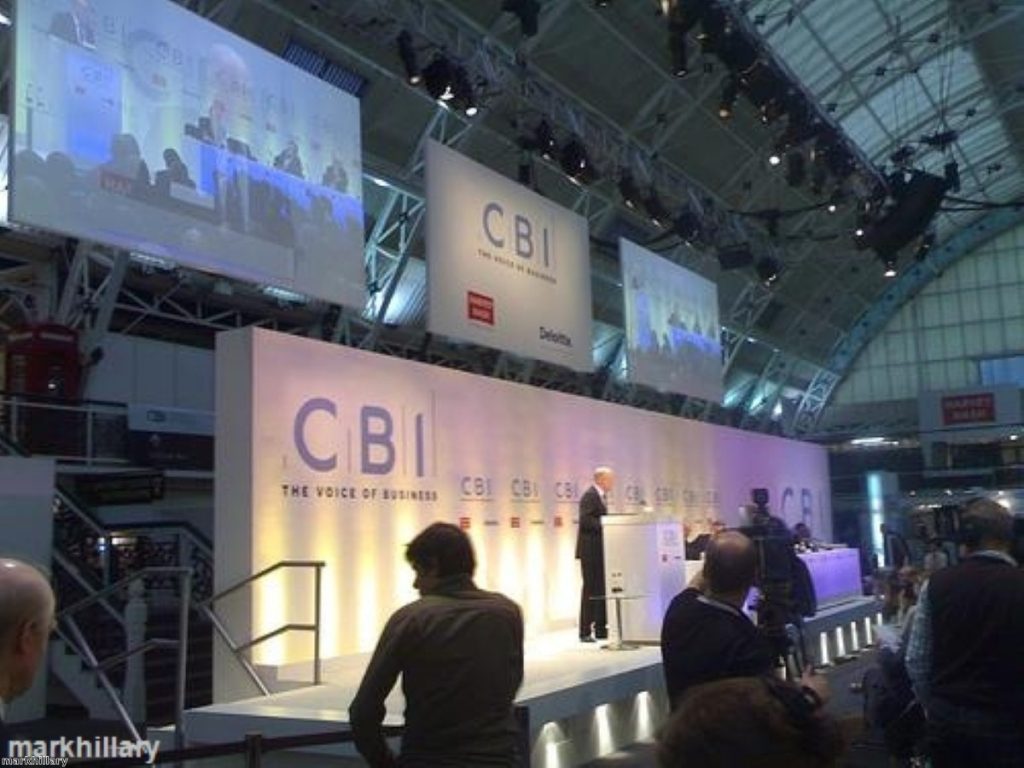Cameron bids to inspire business amid faltering confidence
By Alex Stevenson Follow @alex__stevenson
Britain can only secure economic growth by dealing with its debts, David Cameron has told business leaders.
The prime minister argued the two are "essential companions" in a speech at the CBI conference in central London.
He confronted "fears about the immediate future" amid the ongoing eurozone crisis and Britain's stagnant economy, which is expected to remain broadly flat until at least the beginning of next year.


Two-thirds of business leaders surveyed ahead of today's conference said their level of confidence had dropped since August, while one-third were reviewing investment plans as a result.
"If we are to build a new model of growth, we need to give a massive boost to enterprise, entrepreneurship and business creation," Mr Cameron told business leaders.
"Put simply, Britain must become one of the best places to do business on the planet.
"People who ask: 'what do radical deregulation and reforming employment law have to do with the immediate priority of getting growth?' miss the point.
"The answer is simple: If we want a new economy and a new type of growth we have to act to make it possible."
The CBI has published a report today calling on ministers to increase exports from 29% of GDP in 2010 to 36% in 2016.
Doing so will require a net increase from -2.4% to 2.5% over the same period, but the CBI says the challenge can be met by increasing the proportion of small- and medium-sized companies which are exporting from 20% to 25% by 2020.
Mr Cameron said next week's autumn statement would feature "a massive credit easing scheme" which would use the strength of the government's balance sheet to pump billions of pounds into loans for SMEs.
He said chancellor George Osborne would also unveil the next stage of the government's plans to "transform infrastructure", which will be targeted at improving the viability of the government's enterprise zones.
CBI director-general John Cridland said Britain needed to recover from its "lacklustre" recent performance.
"The continued crisis in the Eurozone underlines just how important it is for the UK to diversify its export efforts to high-growth countries," he said.
"Given that we're already playing catch-up with many of our competitors, we must act now or never to target high-growth economies, leapfrog the competition and deliver our growth potential."
Shadow business secretary Chuka Umunna voiced doubts about the Ipsos Mori poll for the CBI, saying dented confidence was "deeply concerning".
Plans for expansion, investment and increased employment are all being scaled back as a result of the uncertain economic situation.
"Before the full impact of the eurozone crisis, the government's decision to cut spending and raise taxes too far and too fast has undermined business confidence, held back growth, stalled job creation and left Britain’s economy dangerously exposed," he said.
Mr Umunna blamed the government's plans to cut investment in science, its cut in capital allowances and the decision to scrap feed-in tariffs for solar energy for the lack of confidence.
"The government has repeatedly shown how out of touch with business it has become," he added.
"We need action for a new economy which will work for business in the long term and to help businesses grow now."

